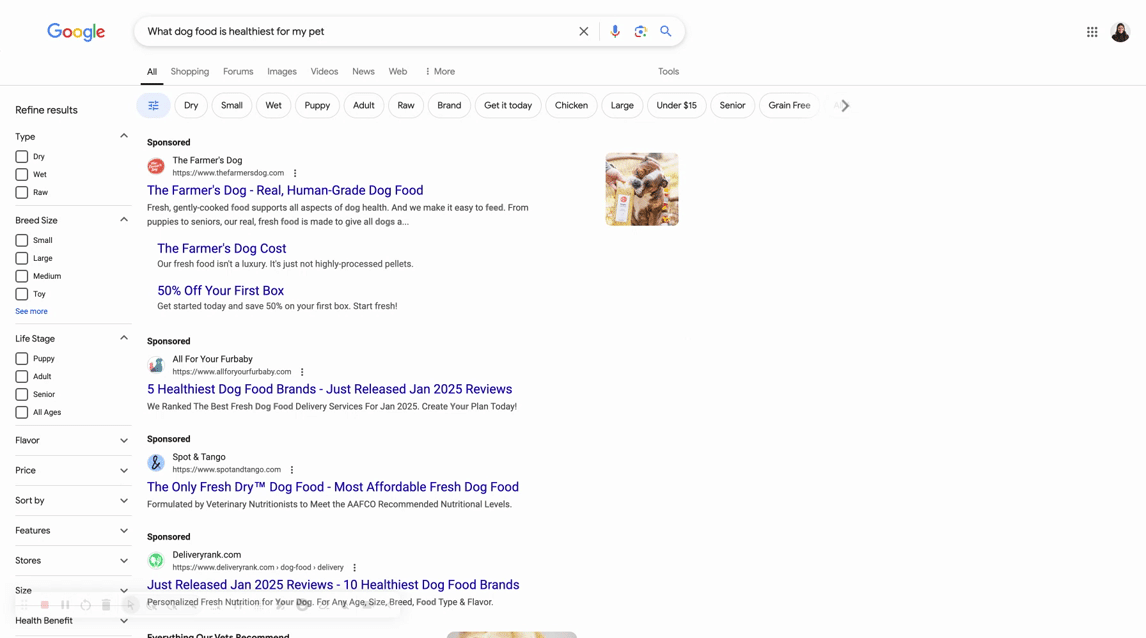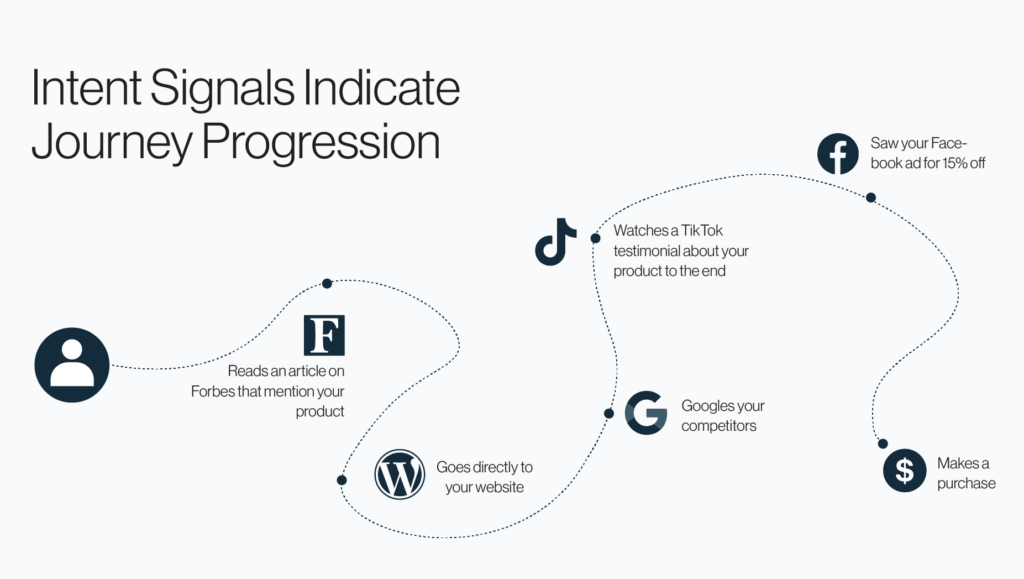
Since 2023 AI has been dominating the conversation ever since ChatGPT came onto the scene and forced big players like Google to respond with their own AI product. Now, as we start 2025, we see Google’s search product being confronted with new competition in the search landscape by ChatGPT, Perplexity amongst others trying to topple Google’s hold on the search market. You can read about our thoughts on how the results from these new competitors stack up, but today we want to discuss the applications these new tools present to marketing agencies and business owners.
What’s Changed with Search?
You might be thinking, “well what’s exactly changing here? Haven’t search engines been using AI for a while?” Yes, but for Google in particular, the change applies to the real estate available on the SERP (search engine results page) which pushes down more organic opportunities for ranking on page one. Google has been making changes like this for a while with the inclusion of a local pack, then shopping carousels, different featured snippets and now AI Overviews.
Because organic results are getting pushed down even further, the next opportunity is to be a chosen source for AI Overview’s generative results. From the many experts that have explored this topic, traditional SEO is still the way forward to be sourced for answers. This means continuing to focus on trust, expertise, and leveraging your credibility however you can in the content that you write.
What hasn’t changed and has been pretty consistent are the location of ads on a SERP, found at the top of the page (above the AI Overview) and at the bottom of the page. If you were trying to target users who are seeking information specifically on Google, targeting your Google Search Ads above the AI overview could be a good way to get on top of informational/top of funnel queries.

Content Strategy
Most businesses or agencies may turn to AI in order to help them plan out the content in various different mediums like a website, social media posts or even structuring copy for print materials.
Queries like:
- “what kind of topics about marketing would a business owner want to learn about?”
- “give me a social media strategy to drive more form fills for a marketing agency”
Many of these results tend to focus on the basics of a content marketing plan, which may be helpful for business owners but also may be common sense for professional marketers. Either way, the ability to refine these results is really where these tools shine. ChatGPT and Perplexity are both particularly helpful here with their conversational UI format, able to refine the query and answer to get a response that fits your need. Google’s AI Overview in its current form doesn’t offer refinement, something they updated since it was being tested in the Google SearchLabs.
Here are some strategic ways to leverage these tools and get specific information that can help inform your content strategy:
- Generate topic ideas to build on your authority in a vertical/industry
- Maybe you’ve already started a blog strategy or you’ve run into a wall trying to come up with new ideas. Asking these tools, “I write about _____, I’ve created content about _____, _____, and _____, what other topics can I create articles about?”
- Create user intent mapping to help plan what kind of content will best speak to certain users
- Knowing who your audience is key and understanding their paint points will help you strategically create content that helps move users down the funnel. Consider asking, “Create user intent mapping for a website for a marketing agency.”
- Normalize your language for your audience and make the tone more conversational
- Especially for people working in industries where the language can get technical, rewriting your copy for users to easily understand your copy could make a huge difference for their audience. Consider asking, “Rewrite the following copy so a child can understand: _____.”
- Expand your current content by adding multi-format options like imagery/video to help add context
- While the writing is what gets picked up by search engines and crawling agents used by AI, webpages that are a wall of text may get little read time and a bounce off the site. Asking AI: “What kind of multimedia should accompany this description to help the page rank on Google?”

Paid Search Strategy Refinement/Campaign Optimization
For businesses and agencies with active campaigns, sometimes it’s not always obvious how to further improve their campaigns. For experienced marketers, the campaign optimizations needed for email marketing, paid media, or social publishing are typically found within the tools they use to manage their campaigns. For the average business owner who does not have the time to dig into ad platforms or content management systems, utilizing these AI search tools to help find a starting point is a valuable way to course correct.
The more specific you are with these tools the more you’re likely to get a helpful response to your unique situation. What we’ve seen is the more general the question the more generic the answer. Since the results we’re getting are paired with sources, getting the sources for your specific question will result in links to websites that can add additional value to what the tool generates. Some initial ways you can try to leverage AI search include:
- Distilling a vast amount of information quickly
- Comb through a large spreadsheet quickly for important details
- Example query: “Review this spreadsheet for the most sold product by CT residents”
- Taking raw data and trying to summarize the data succinctly
- If you’re unsure what the data from your campaign is telling you, asking an AI search tool to summarize the information with a “why this?”
- Example query: “Review this spreadsheet from our paid media campaign setup in Google Ads where each row shows a campaign’s performance with the following KPIs: cost-per-click, impression share, clicks, and conversions.”
- Finding new ways to write headlines for stale or competitive ad spaces
- If you’ve been spinning your wheels trying to figure out how to say your unique selling proposition, try analyzing competitor headlines and identifying gaps they’re not addressing.
- Example query: “Based on these 5 competitive headlines, write me 10 new headlines that don’t match these competitors but promote the same service.”

Conclusion
AI will undeniably play a large role in marketing tactics going forward, what will distinguish the successful marketers will be how they are able to understand writing queries that can draw information from these AI search tools. This is not something that will be easy from the beginning but by understanding how to ask AI and LLMs for the information you are seeking marketers will be able to uncover data for their campaigns with additional source material that would take much more time otherwise.